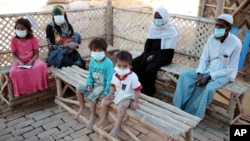Rohingya refugees in Bangladesh are struggling from mental health issues, including suicidal thoughts, while almost half of the children are malnourished, according to aid agencies racing to boost services.
Focus groups involving 300 people living in the densely populated "mega-camp" in Cox's Bazar District found that 38 percent of children and 74 percent of adults "felt sad always."
Suicidal thoughts were reported by 4 percent of youth, according to an assessment by the International Organization for Migration (IOM), which has not previously been made public.
"It's an alert that youth are neglected from services," said Olga Rebolledo, a mental health and psychosocial support coordinator with IOM. "They don't have any options here right now, no possibilities for jobs or education."
About 700,000 Rohingya Muslims have crossed into Bangladesh from Myanmar since an Aug. 25 crackdown by the military in Rakhine state. Rohingya refugees reported killings, looting and rape in response to militant attacks on security forces.
The government of Buddhist-majority Myanmar says its forces have engaged in a legitimate campaign against Muslim "terrorists," and has denied atrocities against civilians.
But aid agencies said many refugees are traumatized.
One elderly woman — whom the Thomson Reuters Foundation is not identifying due to the risk of retribution against her relatives in Myanmar — said she could not stop thinking about her son and husband who were killed by soldiers.
"I dreamed about my son twice," she said, sitting in a tarpaulin and bamboo shelter. "Once he was bringing me seeds to plant, and the second time he was hiding behind a wall."
Suffering from trauma
Her feelings are common, according to the IOM study, which found 63 percent of adult participants are constantly grieving for lost family members.
Rebolledo said a small percentage of people who experience such events may need psychiatric treatment but for others establishing stable living conditions, including security and access to food and education, can restore a sense of wellbeing.
But improving living standards is a challenge for aid agencies scrambling to provide services to the fastest growing refugee population in decades.
The population in the camp swelled to almost 600,000 from about 19,000 in four months, according to the United Nations refugee agency, UNHCR.
Food shortages were the most recurrent issue affecting the refugees' mental health while inadequate shelter, poor sanitation and hygiene were also frequently cited as concerns.
One quarter of children in the camp are acutely malnourished, with 7.5 percent at a high risk of death from severe malnutrition, according to a study published on Tuesday.
More than 43 percent of children are chronically malnourished, said researchers from the United States' Centers for Disease Control and Prevention, the charity Action Against Hunger, and UNHCR.
The IOM study also found 40 percent of refugees cited "not being recognized as citizens" as psychologically destabilizing.
"We can't do anything about that," said Rebolledo. "What we can do is show them that they have resources and a very strong sense of identity as a community."
Strengthening community bonds can promote mental health, said Rebolledo, and the IOM is partnering with organizations as the Red Cross and Action Against Hunger to scale up services.
In a program partially funded by the European Union, they will set up mobile teams to provide counseling and help organize community groups to engage in activities such as training, theater or working for better living conditions.
This story was written by Reuters.





